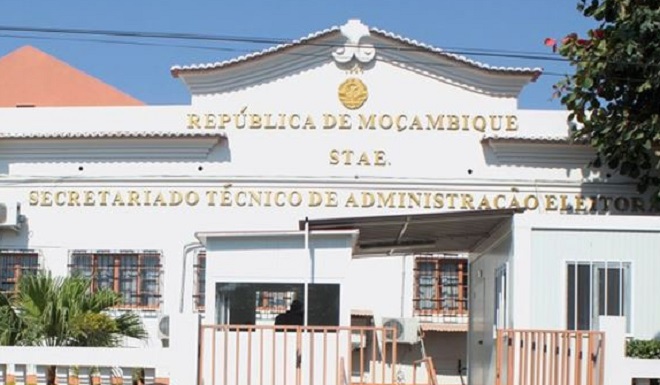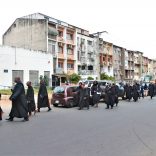EUMAM MOZ delivers Media Training for Senior Officers of the FADM
Mozambique elections 3: Frelimo again blocks STAE director-general – By CIP and Joseph Hanlon

File photo: Domingo
- Frelimo again blocks STAE director-general
The swearing-in ceremony of the new director-general of STAE, due to take place on Wednesday 21 September, was blocked by Frelimo, which opposes the CNE’s choice of Loló Correia. Yet another political manoeuvre forced the postponement of an already announced public event at the Joaquim Chissano Conference Centre, with invitations issued and agenda approved.
Correia had been selected as director-general of STAE (Electoral Administration Technical Secretariat) by a selection panel of members of the CNE (National Electoral Commission). The Frelimo party leadership opposed his selection and directed its members in CNE to vote instead for Helena Garrine, who had come bottom of the selection panel rating.
- Democracy prevailed. Three of the 10 members of CNE representing Frelimo went against their party’s orientation and voted in favour of Correia, who already had the support of seven opposition members. Correia won the election 10-7. With an swearing-in with full pomp and ceremony already announced, Frelimo intervened again. This time it is aiming to annul the selection and force the launch of a new recruitment process.
.
Last minute protest submitted
Jose dos Santos Anjos Grachane, third on the list of candidates, has become the main actor in this episode of a soap opera that has been going on for almost three weeks. Grachane filed an appeal Monday, 19 September, claiming that he “understood that the general regime for entry into public administration would be applied to the referred competition” and “expected to be subject to a formal interview, which did not happen”. However, the terms of reference produced by the CNE called for an open competition of “curriculum vitae evaluation…” and limited the evaluation to candidates who have made a career in the electoral administration bodies. Grachane argues this violates various normal procedures for hiring and unfairly reduced his ranking.
It is believed that Grachane was guided by senior Frelimo party officials who do not accept the defeat of their candidate, Helena Garrine. Frelimo still want a vote to annul or uphold the decision that brought Loló Correia to office, using the model of each member of CNE writing down, on a blank sheet of paper, their vote. This model is not a secret ballot, because it allows Frelimo to identify, by handwriting, its representatives who have betrayed party orientation.
If the decision is in favour of the annulment of the process, the CNE will launch a new public recruitment and selection of the director general. The appeal is now with the Commission for Legal and Deontological Affairs of the CNE.
- Can the President of the CNE annul a CNE decision?
After receiving the appeal contesting the public tender, CNE Carlos Matsinhe, on 19 September, issued an order to postpone the swearing in, without recourse to the full CNE.
The representatives of the opposition parties at CNE contested the decision to postpone the inauguration on the grounds that Garrine’s complaint was too late, coming after the naming of Loló Correia as the new director-general of STAE had already been published in Boletim da República (177, Series I, 13 September). Representatives of Renamo and MDM also argued that the CNE President’s decision to postpone the inauguration “is illegal” since he does not have the authority to annul a decision of the full CNE.
Renamo national representative Venancio Mondlane, at a press conference, said Carlos Matsinhe’s order “is illegal, illegitimate and incompetent because it represents an undue usurpation of a deliberative act from the sphere of the CNE’s collegial body, its plenary.”
We await the next episode of the soap opera.
- Creation of new municipalities likely
It seems increasingly likely that government will announce new municipalities (autarquias) before the electoral registration early next year. The studies of the territorial units that will determine which town (vilas) will rise to the category of municipalities have been concluded. It seems likely that the proposals will be discussed soon in the Council of Ministers for submission to Parliament.
The number of new municipalities is unknown. Before past elections the number was increased by one municipality per province, but smaller provinces are running out of towns large enough to be municipalities.
Parliament’s agenda, released this week, does not yet include the discussion of new municipalities, but any increase would have to be approved at this session to allow enough time to prepare for additional elections.
Registration delays possible
There is still no money for the pilot census, proposed take place befoe the end of October, making a postponement increasingly likely. The pilot registration, to test equipment and training, will probably be in four municipalities, not yet named.
.
Voter registration is scheduled to begin in February, precisely at the height of the rainy season and the peak of agriculture in rural areas. Even in municipalities, the rain will disrupt registration and many people will work in their fields, reducing registration numbers. Also, money is not yet available. So a postponement of registration is possible.
By Centro de Integridade Pública (CIP) and Joseph Hanlon













Leave a Reply
Be the First to Comment!
You must be logged in to post a comment.
You must be logged in to post a comment.